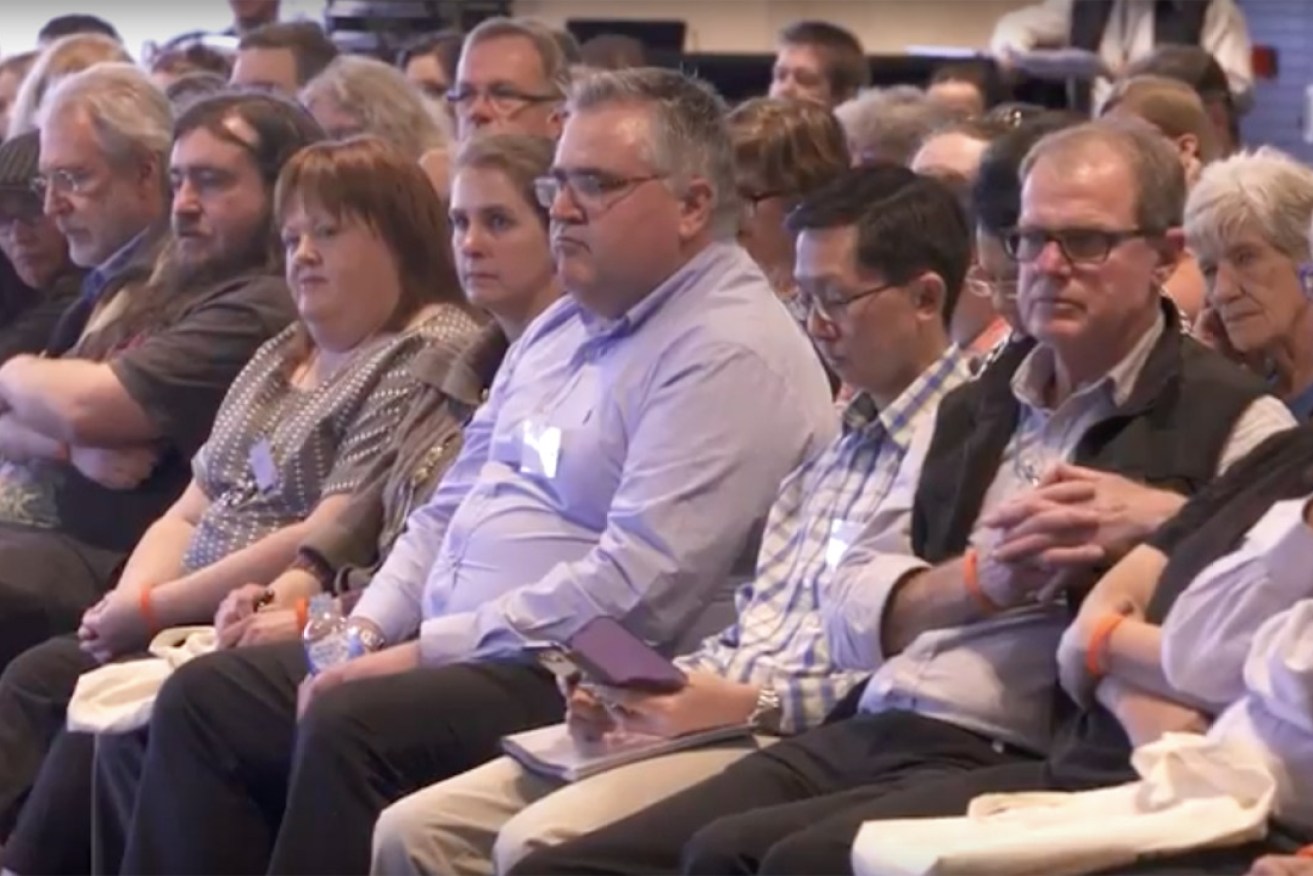Nuclear jurors question witness selection process
The organisation running SA’s second citizens’ jury on nuclear waste storage has come under fire over claims it has inappropriately intervened in selecting witnesses to present to the jury.


Citizens' jurors listen to Premier Jay Weatherill and Nuclear Fuel Cycle Royal Commissioner Kevin Scarce on the first day of the second citizens' jury on nuclear waste storage in SA. Image: YouTube/YourSAy Nuclear
Some members of the 350-person jury have told InDaily they voted for a group of witnesses to present information about nuclear waste storage but the facilitator of the process, DemocracyCo, subsequently invited additional witnesses without explicit jury consent.
DemocracyCo concedes it did add further witnesses after a voting process, but says that is “standard practise” in citizens’ juries.
Juror Brett Aylen, an architect, told InDaily: “I do feel like I’m being a little bit manipulated by the process.”
He said DemocracyCo facilitators were surprised by the jury’s witness selections and wanted to “balance it up by adding in some of the more pro-nuclear witnesses”.
“They seemed a bit surprised at our selections,” he said.
“If they had have declared that position in advance [that more witnesses may be added] it would have been more acceptable.”
Describing the process of witness selection to InDaily, fellow juror Joanne Waters said all members of the jury were given five red dot stickers to indicate which witnesses they wanted to appear before the jury.
But after a group of witnesses had been voted for in this way, “DemocracyCo suggested that they be allowed to even up the witness ratio, for and against [a nuclear waste storage facility],” Waters said.
Another juror, who did not want to be named, told InDaily the facilitators weren’t happy with the selections and “they immediately took steps to try and introduce other witnesses”.
Juror Diana Mieglich said she was comfortable with the addition of further witnesses, but suggested there may be “a slight bias” in favour of nuclear waste storage inherent in the process.
She added that there were further “gaps” in the information she and other jurors were able to receive from witnesses – such as aspects of constitutional law related to nuclear waste disposal.
But DemocracyCo CEO Emma Lawson said extra witnesses – three in total – were only added in order to better in inform jurors on subjects about which they themselves had expressed interest.
She said before jurors voted for witnesses they were asked to write down questions they had, and to detail the sorts of information they wanted to learn from the process.
“On the basis of that I realised there were some gaps,” she said.
In particular, Lawson said, jurors had expressed interest in better understanding modelling about the financial consequences of hosting a nuclear waste dump in South Australia and the impact of radiation on human health.
She said economic modelling in the business case compiled by consultancy Jacobs Group for the Nuclear Fuel Cycle Royal Commission was “clearly something they wanted to understand, but hadn’t selected [a witness for]”.
“There was [also] a gap in the area of regulation … and the impact of radiation on human health.”
Conservation Council CEO Craig Wilkins – whose organisation is represented on the stakeholder reference group charged with advising DemocracyCo on which witnesses to present to the jurors – questioned the methodology of the citizen’s jury process.
“The Citizen’s Jury has been a difficult process … because they have tried to take a methodology that is usually for groups of far less than 50 people and, in a world first, make it seven times larger,” he said in a statement.
“The Government has badly underestimated how much extra time and resourcing a larger group needs to ensure a safe and transparent process.”
But Business SA CEO Nigel McBride, whose organisation is also represented in the stakeholder reference group, told InDaily that anti-nuclear views were overrepresented in the process.
“People do get upset because their fringe ideas aren’t always represented … by witnesses,” McBride said.
He said anti-nuclear organisations had been reluctant participants in the stakeholder reference group.
“DemocracyCo have done a very, very good job in the circumstances.”
DemocracyCo had played “very much a straight hand” and remained neutral facilitators of the process.
“The whole process … isn’t simply one based on what the jurors have to say,” he said.
“If [DemocracyCo] believe there’s major parts of the evidence that have been left out they have discretion [to add them in].
“All of us wanted to see them (the jurors) get the breadth of information.”




